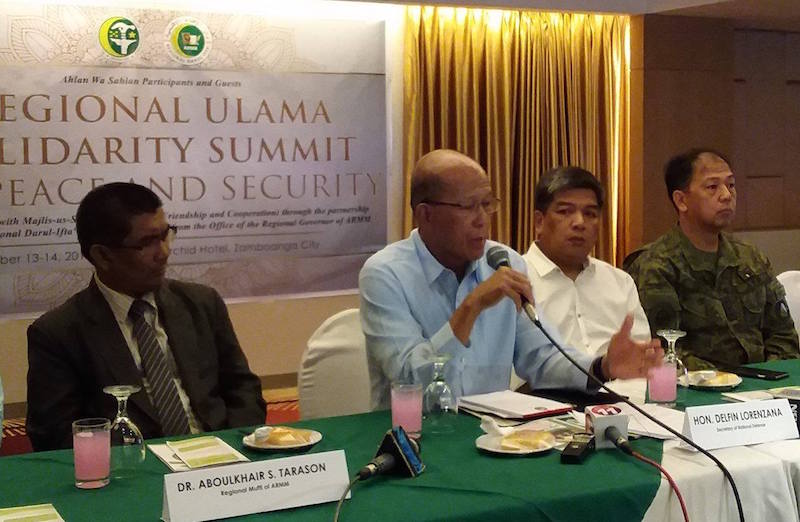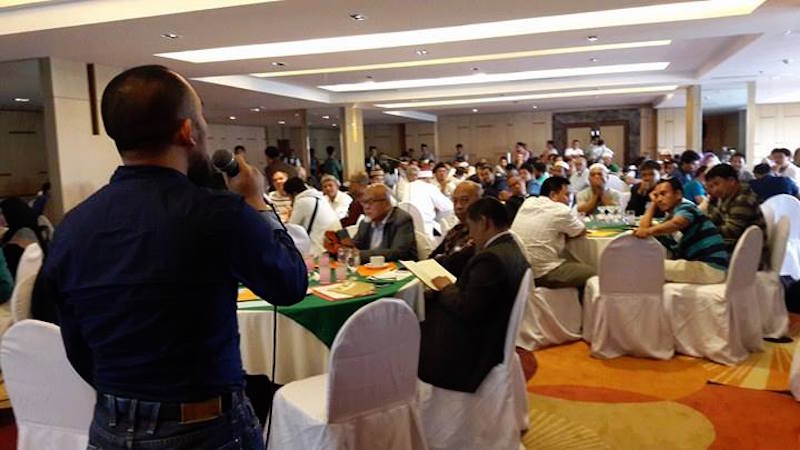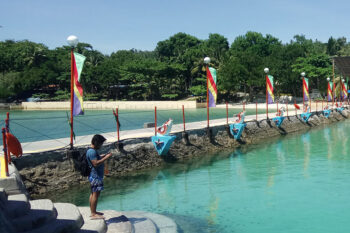ZAMBOANGA CITY (MindaNews / 18 October) — At the press conference announcing the death of the Marawi Siege leaders Isnilon Hapilon of the Abu Sayyaf and Omar Maute in Marawi City last Monday, Defense Secretary said they “got the support of the Ulama in Mindanao that they will support the program of government” to address the problem of violent extremism
“They’re on board on this,” Lorenzana said.
Lorenzana’s pronouncement in Marawi came three days after he vowed at the start of the two-day Regional Ulama Solidarity Summit on Peace and Security here on October 13 to “keep the lines of dialogue open” with Muslim religious leaders down to the barangay level, to educate the military and police as part of their periodic Troop Information and Education (TINE), on the one hand, and for the Muslim religious sector to be updated with the current campaigns of the security sector on violent extremism.
Lorenzana proposed that a mechanism be established between local government units from the provincial down to barangay level, and the Regional Darul Ifta, the Muslim Council of Religious Opinion created by the Autonomous Region in Muslim Mindanao (ARMM), for constant exchanges and education of the military, police and Muslim religious leaders.

Defense Secretary Delfin Lorenzana proposes a dialogue mechanism between the military and Muslim religious leaders down to the barangay level during the Regional Solidarity Summit of Ulama for Peace and Security on October 13-14 in Zamboanga City. WIth Lorenzana are Regional Darul Ifta Grand mufti Dr. Aboulkhair Tarason (L), ARMM Governor Mujiv Hataman and Lt. Gen. Carlito Galvez, chief of the Western Mindanao Command. Photo courtesy of MAJLIS-US-SHURA
ARMM Governor Mujiv Hataman and the Ulama were one in their recommendations to end the current menace of violent extremism: that a counter-narrative from the Muslim learned be heard and supported; and that there should be unconditional support for the empowerment of Ulama so that they can effectively perform their role in guiding the Muslim community and in rehabilitation and reformation of the waylaid young Muslims. A plan for the establishment of a Pagtarbiyyahan or spiritual reformation center in one of the autonomous provinces was revealed by Regional Darul Iftah Executive Director, Sheikh Abdulmuhmin Mujahid.
In the succeeding workshops the following day, the Ulama also proposed that the Regional Darul Ifta be institutionalized as a national mechanism, and be made a sitting member of the National Security Council or at the very least, given an advisory role.
Misconceptions about Salafism and Wahabishm
The Muslim religious leaders’ assembly was primarily aimed at addressing the misconceptions and misrepresentation on the basic definition of Salafism and Wahabism, two important concepts that have become the dark stamps labeling and denigrating many Muslims in Mindanao
Regional Darul Ifta Grand mufti Dr. Aboulkhair Tarason whose lecture was the keynote in the two-day Summit, said that,“Radicalism” which has become synonymous with violent extremism is a modern coinage that was never found in the context of Holy Qur’an and Sunnah tradition or even in the light of Sharia. Its contemporary appearance and usage in modern understanding may not be Islamic and is a creation wrongly attributed to Islam. However, the Holy Quran and the Prophet Muhammad, peace be upon him, have indeed warned Muslims to guard against “excessiveness” which is tantamount to doing something extravagantly and beyond the limit even in matters of religion. Reading from his lecture and quoting surah Al Maida verse 77, Dr. Tarason, said excessiveness is forbidden or haram.
Sheikh Zayd Ocfemia, chair of the Assunnah Foundation and a guru in a markaz here, said Salafism is “not a religious sect nor is it a madhab” (Islamic school of thought).
“It is without clear and defined specific jurisprudence followed by the school of followers as requisite of a sect or a school of thought sanctioned and authorized in Islam. But it is a methodology of the Salafus Salihi (the righteous predecessors) as practiced by the Prophet himself – peace be upon him-, his companions, and the followers of the companions. Therefore to say that salafism does exist as an ideology is to be misled by definitions and unjust labeling of Muslims, usually by outsiders of mainstream Islam, who are probably alienated from Muslim communities and less informed of their actual practice,” Ocfemia added
Linking salafiya (the tendency of salaf) and a Muslim practitioner, assalafi (one who manifests a salafi character), to violent extremism, and tagging a manifestation in individual or group adhering to it as Islam or to be Muslim, is an over simplification, the groups during workshop agreed.
Dr. Tarason also clarified that Salafus Salih or the rightful Salafi is a prophetic tradition of genuine methodology or manhaj of moderation combatting excessiveness and radicalism and unifying Muslims, ways that was emulated by the latter-day Muslims in the time the rightly guided caliphs. In fact, majority among the ranks of ulama present in this gathering, Tarason informed Lorenzana, are salafs because they exhort to go back to the roots of Islam in the manner of prophetic exemplars.
Enlightening
Admitting that the security sector has been mostly informed by foreign literature on extremism and terrorism published online and from academic researches of Filipino scholars, Lorenzana and Western Mindanao Command chief, Lt. Gen. Carlito Galvez, who listened to the lectures, expressed their awe and gratefulness for the enlightening input of Dr. Tarason.
Muslim scholars like Dr Tarason caution academic researchers and political analysts from confusing references coming from two even widely-disparate periods of Morrocan Abdulwahab Bin Rustum (death 205H) and Saudian Muhammad Bin Wahab (death 1206 H), the former being known as the proponent of more “destructive” kharijite (i.e. khawaridz) tendency that was banned in his time.
 A young aleem recommends the institutionalization of Daru Ifta and government subsidy for madaris as a way of empowering the Muslim religious sector during the Regional Solidarity Summit of Ulama for Peace and Security on October 13-14 in Zamboanga City. Photo courtesy of MAJLIS-US-SHURA
A young aleem recommends the institutionalization of Daru Ifta and government subsidy for madaris as a way of empowering the Muslim religious sector during the Regional Solidarity Summit of Ulama for Peace and Security on October 13-14 in Zamboanga City. Photo courtesy of MAJLIS-US-SHURA
Earlier, in a related Focus Group Discussions before the Summit, NCMF Region IX Legal Affairs director, Yasser Apion, had similar observation, reiterating that there appears to have proliferated inaccurate claims and misrepresentations equating violent extremism and terrorism to alleged ‘Wahabbi’-leaning sect, and just as in the demonization of Salafiya, this usually arises from among pundits and scholars who try to speak for Islam and provide interpretations even if they do not have the rigorous religious training and proper scholarly authority as an aleem.
Other Muslim religious luminaries were also present to shed light on the role of ulama in ensuring security and promoting peace. Aleem Jamal Munib, Vice President of Ulama Council of Zamboanga Peninsula (UCZP) and Davao City director of Madaris Education program, shared an inspiring story on best practice of the 15-year old integrated madrasa education of Davao City, now successfully being replicated in predominantly non-Muslim cities.
Moro Question
Secretary Jesus Dureza of the Office of the Presidential Adviser on the Peace Process was represented by former Basilan governor and congressman Abdulgani Gerry Salapuddin, now consultant to the Government Peace Panel of the Office of the Presidential Adviser on the Peace Process.
Salapuddin, a former commander of the Moro National Liberation Front (MNLF), gave a comprehensive political analysis on the link between the Peace Process and the phenomenon of radicalism in the ARMM provinces and how the Muslim community together with the Philippine government bureaucracy must move forward.
Genuine autonomy, he emphasized, must not be held hostage in a perpetual legal debacle and constitutional hurdles may be waived to give way to a sincere solution for the age-old Moro question.
Speaking extemporaneously, Salapuddin’s candid assessment yet comprehensive grasp manifests an internalization of the pathology of the so called ‘Moro problem,’ reminding his audience as to how, even as he has long joined the government, the Yakan statesman remains an epitome of a Bangsamoro nationalist’s undying aspiration for self-determination and, in the same self, as Muslim, a steadfast peace-maker.
Follow through
The Regional Ulama Solidarity Summit is a follow through of the ARMM Ulama Summit on Violent Extremism and Terrorism held on May 12-14, 2017 in Cotabato City. It was organized by the ARMM Regional Darul Ifta with support and funding from the Office of the Regional Governor of ARMM, in collaboration with Majlis-us-Shura, a loose coalition referring to themselves as Assembly for Friendship and cooperation, as the overall Secretariat.
The Regional Summit became a consensual platform of ulama from the ARMM provinces of Basilan, Sulu, Tawi Tawi and the adjacent provinces of Zamboanga peninsula, who were joined in by the ulama from other major cities in the country namely Davao City, Baguio City, Metro Manila, Cobato City, General Santos city, and the province of Palawan.
The Summit reaffirmed and asserted the authority of the ulama as the knowledge sector with adequate and appropriate, and needless to emphasize, the proper knowledge tools of understanding the Muslims, as well as the accurate witnesses of the practice of their faith, and more importantly, an internal agency and testimony of how Islam is applied in their personal life and in their society; and as to how, throughout history, Muslim practice and acts based on their specific societal and environmental contexts have evolved through the time.
A counter-narrative crafted by the Muslim learned themselves is deemed as guidance to give the direction for the Muslim Ummah on how to deal with and where to stand against violent extremism and terrorism in their midst. That the ulama must be able to exercise this authority as learned scholars in Islamic schools and traditions, and basing on literature written by the same religious traditions, is a key to countering the spread of violent extremism.
Reclaiming Islamic concepts
Many of the participating ulama from the provinces said the event opened much welcomed opportunities not only for reclaiming the Islamic concepts and cleansing them of the malicious ascriptions by those of lesser knowledge or misinformed sources, but also for reclaiming the voice of the ulama.
The ulama exhorted government leaders and agencies wanting to address the issues of violent extremisms to engage the religious sector themselves and capacitate them to be a sustainable institution of the Muslim community.
Col. Taharuddin Ampatuan, representing the Muslim professionals and ulama from the grand Cotabato empire provinces, proposed a legislative measure to institutionalize the role of ulama in Muslim governance. “Why are the ulama not considered as commissioners in the NCMF?” he asked.
Ustadh Sahi Udja of Sulu Association of Muslim Professionals and Ulama seconded the proposal and added that government should subsidize the madaris education, support the accreditation and professionalization of the asatiz and sheikhs. “This is not only reactive about combatting extremism, but is a timely intervention consonant to the recommendations of the GPH-MILF mandated Transitional Justice and Reconciliation Commission (TJRC) as a reconciliatory procedure and affirmative action towards redressing historically-rooted grievances”. Prof. Udja has been actively involved in TJRC listening processes, of which the ulama were also participants in the discussions.
The final output of the Summit drew up strategic action points for ulama and their respective communities to expand and detail in planning how to move forward. A thematic seven Intervention keys identified and developed in the first Ulama summit is being used as the template for identifying issues, projecting targets and designing strategies as religio-spiritual, socio-cultural, educational, economic, political, security, and psychological interventions. (Mucha-Shim L. Quiling with reports from Majlis-Us-Shura, for MindaNews)
